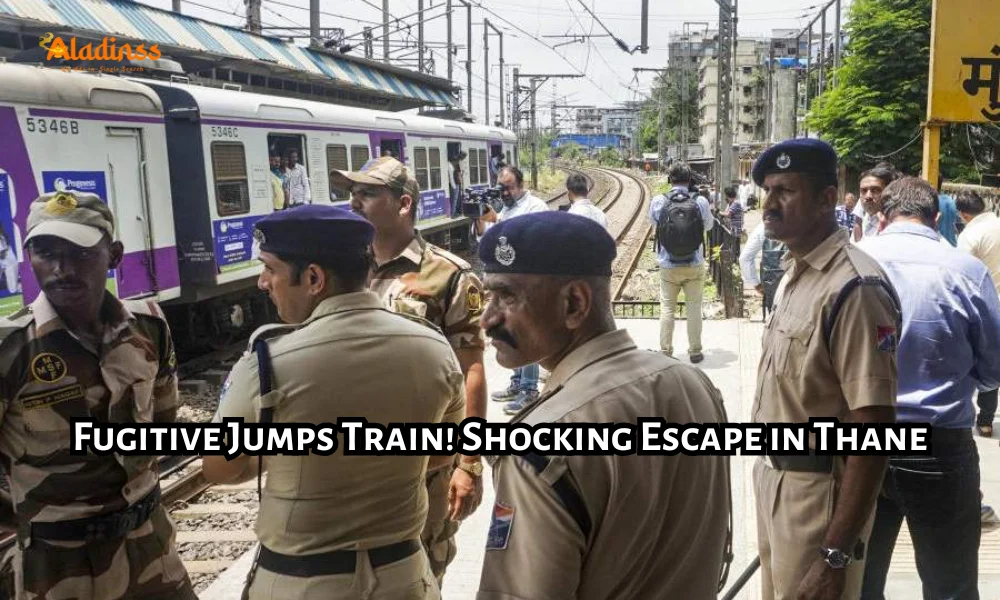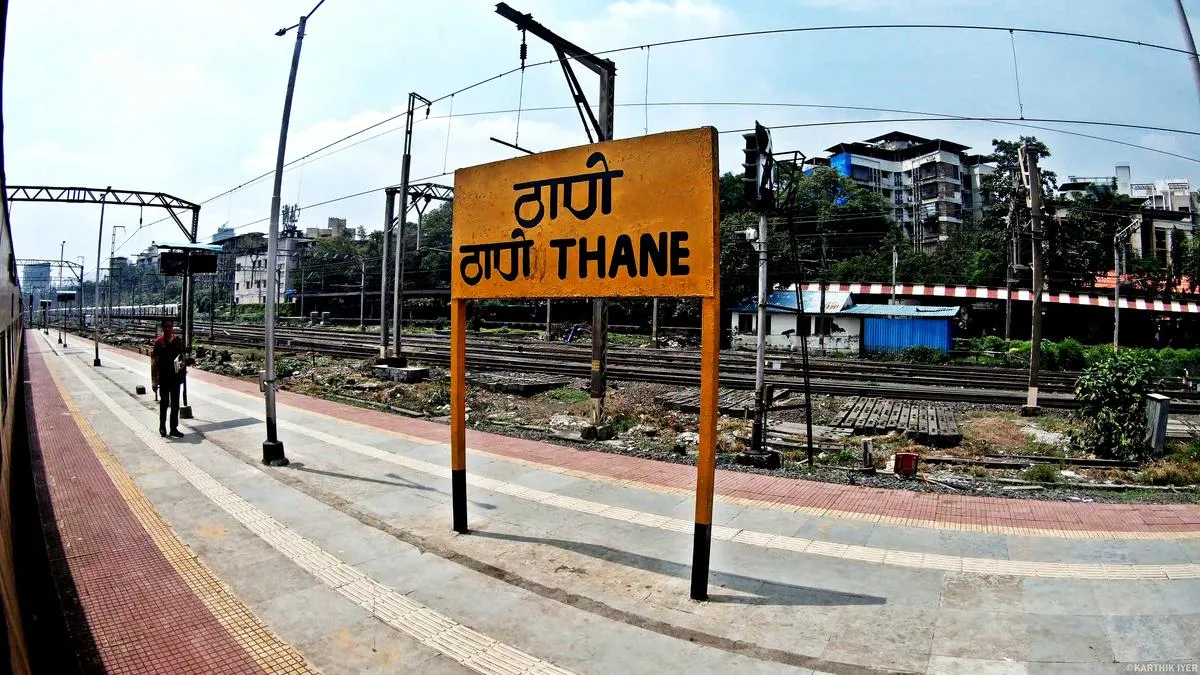Suicide Abetment Accused Escapes Train Custody in Thane

Accused in Suicide Abetment Case Escapes Custody by Jumping Off Moving Train in Thane
In a shocking incident, a man charged with abetment to suicide managed to flee police custody by leaping from a moving train near Kalyan station in Maharashtra’s Thane district. The escape occurred on Monday evening while Telangana police were escorting the suspect from Surat, Gujarat, back to their state for further investigation.
According to officials from the Government Railway Police (GRP), the accused exploited a brief moment of distraction to execute his daring getaway. A massive search operation has been launched across the region to recapture the fugitive, who remains at large as authorities intensify efforts to trace his whereabouts.

Background of the Suicide Abetment Case in Telangana
The accused was involved in a turbulent romantic relationship with a woman from Telangana. Senior police inspector Tanaji Khade of Karjat GRP revealed that frequent arguments and emotional distress allegedly pushed the victim into severe depression, ultimately leading to her tragic decision to end her life.
Following the woman’s death, her family filed a complaint, prompting Telangana authorities to register a case under Section 306 of the Indian Penal Code for abetment to suicide. The suspect, fearing arrest, fled the state and went into hiding. Intensive tracking efforts eventually located him in Surat, where he was apprehended by a special police team.
To avoid air travel risks and maintain discretion, officers opted to transport the accused via train. The journey from Gujarat to Telangana was meant to be routine, but the suspect had other plans. Under the pretext of needing to use the restroom, he moved toward the train door and timed his jump perfectly as the locomotive pulled out of Kalyan station.
How the Escape Unfolded Near Kalyan Railway Station
The train was departing Kalyan around dusk when the incident occurred. Witnesses on board reported hearing a commotion before realizing a passenger had vanished. The accused reportedly waited until the train gained moderate speed, then pushed open the door and leapt onto the tracks below.
Railway police were alerted immediately, and the train was halted at the next station for verification. Fortunately, no injuries were sustained during the jump, though the fugitive likely suffered minor bruises. The darkness and crowded platform area provided ideal cover for his disappearance into nearby neighborhoods.
CCTV footage from Kalyan station is being analyzed to reconstruct the sequence of events. Preliminary reviews show the accused moving casually toward the door minutes before the leap, suggesting premeditation. Police suspect he may have studied train schedules and escape routes during his time in custody.
Police Response and New Charges Under Bharatiya Nyaya Sanhita
The Karjat GRP has registered a fresh FIR against the escapee under Section 262 of the Bharatiya Nyaya Sanhita (BNS), which penalizes resistance or obstruction to lawful apprehension. This adds another layer of legal trouble for the individual, who now faces dual charges in two states.
Multiple search teams comprising local police, GRP, and crime branch units have been deployed across Thane, Mumbai suburbs, and neighboring districts. Informants have been activated, and checkpoints established on major highways leading out of Maharashtra.
Authorities have circulated the accused’s photograph and description to all police stations, railway junctions, and bus depots. A dedicated control room operates round-the-clock to collate tips from the public. Rewards may be announced if initial efforts fail to yield results.
Challenges in Long-Distance Prisoner Transport by Train
Transporting high-risk prisoners over long distances via Indian Railways poses significant logistical and security challenges. While cost-effective, trains lack dedicated detention compartments, forcing officers to rely on standard coaches and constant vigilance.
In this case, the accused was reportedly handcuffed but not chained to a fixed structure inside the coach a common practice due to passenger safety norms. The toilet pretext is a frequently used tactic by detainees attempting escape, highlighting the need for stricter protocols.
Experts suggest using special prisoner vans or air transport for interstate transfers involving serious offenses. However, budget constraints and coordination issues between state police forces often lead to reliance on rail networks, increasing vulnerability to such incidents.
Impact on the Original Suicide Abetment Investigation
The escape has dealt a blow to the Telangana police’s investigation into the woman’s suicide. Critical evidence, including the accused’s phone records, chat logs, and witness statements, were set to be confronted during interrogation upon arrival.
The victim’s family expressed anguish over the development, fearing justice may be delayed indefinitely. Activists have called for swift action, emphasizing that abetment cases often hinge on timely custodial questioning to establish intent and causality.
Legal experts note that even if rearrested, the new escape charge could complicate bail proceedings. Courts typically view custody breaches as indicators of flight risk, making pre-trial release unlikely.
History of Train Escapes in Maharashtra
This is not the first instance of a prisoner escaping from a moving train in the Mumbai-Thane-Kalyan corridor. Over the past decade, at least eight similar cases have been recorded, involving offenses ranging from murder to financial fraud.
In 2019, a chain snatcher jumped off a local train near Diva station, while in 2022, a robbery suspect escaped between Igatpuri and Kasara. Most fugitives were recaptured within 72 hours, thanks to coordinated operations and public cooperation.
Railway police data indicates that over 70 percent of such escapes occur during evening hours when visibility is low and passenger density high. The Kalyan-Dombivli belt, with its sprawling slums and industrial areas, offers multiple hiding spots for absconders.
Possible Hideouts and Support Networks
Investigators believe the accused may have pre-arranged assistance from associates in the Mumbai metropolitan region. Known connections in Surat suggest a broader network capable of providing shelter, funds, or fake identity documents.
Popular hideouts include Ulhasnagar, Ambernath, Badlapur, and Murbad all within a 50-km radius of Kalyan. Construction sites, lodges, and unorganized labor colonies are being combed thoroughly. Border areas with Gujarat and Madhya Pradesh also remain under watch.
Digital surveillance is playing a key role. Mobile tower dumps, bank transaction alerts, and Aadhaar-linked activities are being monitored to detect any trace of the fugitive. Social media platforms are scanned for indirect communication with known contacts.
Public Safety Concerns and Railway Security
The incident has raised questions about passenger safety on long-distance trains. Commuters expressed alarm that a potentially dangerous individual was traveling in a general coach, albeit under escort.
Railway authorities have assured enhanced patrolling and random checks at major junctions. GRP personnel are instructed to use body cameras and maintain stricter custody protocols, especially during night journeys.
Passenger awareness campaigns are planned to report suspicious behavior immediately. Emergency chain-pulling mechanisms will be reviewed to prevent misuse while ensuring quick response to genuine alerts.
Legal Ramifications and Trial Delays
Under Indian law, abetment to suicide carries a punishment of up to 10 years imprisonment. The additional escape charge could add another two to three years if convicted. Combined, the accused faces over a decade behind bars.
The Telangana court handling the original case has been informed of the development. Trial proceedings will remain stalled until the defendant is produced. Victim’s counsel has moved for fast-track designation, citing public interest and emotional trauma to the family.
If the fugitive crosses state or international borders, extradition processes may become necessary. Cooperation agreements with Nepal and Bangladesh common escape routes have been activated as a precautionary measure.
Community Response and Call for Justice
Local residents in Thane and Kalyan have shown solidarity with the victim’s family, organizing candlelight vigils demanding swift justice. Women’s rights groups have highlighted the case as emblematic of emotional abuse leading to suicidal ideation.
Helplines report increased calls from individuals in toxic relationships seeking support. Counselors emphasize early intervention, open communication, and legal recourse to prevent escalation to tragedy.
The incident serves as a grim reminder of the long-term consequences of domestic discord and the critical role law enforcement plays in delivering closure to grieving families.
- Incident date: Monday evening
- Location: Near Kalyan railway station, Thane
- Original charge: Abetment to suicide (Telangana)
- New charge: Section 262 BNS (escape from custody)
- Escort agency: Telangana Police
- Search status: Ongoing, multi-agency operation
- Last known direction: Unknown, possibly toward Mumbai suburbs
As the manhunt enters its fourth day, pressure mounts on law enforcement to deliver results. The case underscores systemic gaps in prisoner transfer protocols while reinforcing the resilience of investigative agencies in pursuing justice against all odds.
Comment / Reply From
No comments yet. Be the first to comment!












